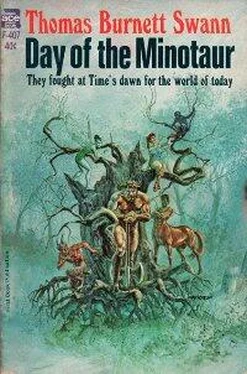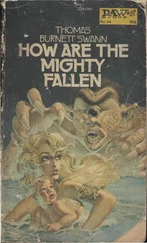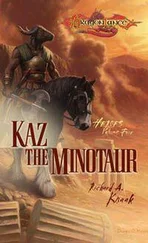“Your dress is sunlight!” I cried.
“Sunflowers.” She smiled. “Every morning I weave it anew, since the petals endure only for a day. Like love.”
“And your hair is a green waterfall. It sings around your shoulders.”
“Perhaps,” she said, “it has learned its song from the trees in which I live. Listened to woodpeckers nesting in the branches, or those smaller birds, the wind-ruffled leaves. But now we must help our friend.”
“He’s a Man,” I whispered. She did not look as if she understood the danger.
“And therefore the more to be pitied.”
His hair, worn long and drawn behind his head in a fillet, was a wonder of darkness, and his face was as white and smooth as the alabaster from which the Cretans carve the thrones of their kings: such a face as the artisan god, Hephaestus, might carve in his underground workshop—unflawed by toil, untouched by time.
Each of us took an arm and supported him to her tree. She did not invite me to enter the trunk. She smiled when she saw my disappointment; for I had heard of the marvels within a Dryad’s tree: the winding stairs cut into the trunk, the secret doors which opened onto rooms where noiseless spiders weave in the light of glowworms, the platforms among the branches, where the Dryads comb their tresses to the soft fingerings of the sun.
“You must not enter, Bull Boy. I am bringing sorrow into my tree, and you have enough of your own.”
“He will do you injury?”
“Perhaps.”
“Why do you shelter him then?”
“I have lived too long in sunlight.”
No Man can enter the forest without alerting the Beasts. All of us, even the light-fingered Thriae and the careless Panisci, take our turns patrolling the narrow access to the world of Men. Everywhere else the cliffs uprear impassable walls (except for my cave, which no one dares to invade). When Aeacus entered the trees, I was not the first to see him. Even as Kora helped him into her house, a conch-shell boomed a warning to all the Beasts, and the next day Chiron, king of the Centaurs, arrived at her tree to question her about the stranger.
“I am going to bear his child,” she said.
Chiron was stunned. A human father and a bestial mother! Would the child be a Man or a Beast? Shaking his mane, he left this foolish Dryad to the sorrow of her own choosing.
I was ten years old at the birth of Thea, eleven when Icarus followed her into the tree and laughed with his first breath. High in the branches, a porch surrounded the trunk, with a bench and a bamboo rail. I used to stand on the ground and wait until Kora appeared with the babies.
“Eunostos,” she called one morning. “Come and visit with me.
“Through the door?” I asked, hoping at least to glimpse the interior.
“Up the outside ladder.”
I saw with dismay that her hair looked as withered as broken ferns, and her gown was woven of brown leaves instead of sunflower petals. She lifted Thea into my arms.
“Is she breakable?” I asked doubtfully.
“Not unless you drop her out of the tree.” She laughed.
At first Thea was crying. “I expect it’s my hair,” I said. “The color has frightened her.”
“No,” she said. “It’s the forest. She always cries when I bring her onto the porch.”
I took her tiny hand and placed the fingers on one of my horns. “See,” I said. “It won’t hurt you. It is like a carrot.”
She fell asleep in my arms.
“I want to hold Icarus too,” I said. “One baby for each arm. They will balance each other.” He was much the fattest baby I had ever seen. When no one held him, he would lie in the crib which his mother had hollowed from the shell of a tortoise and coo at friendly woodpeckers or empty air. He made me think of a fledgling which has gorged itself on worms and grown so plump that it has no wish to fly. It would rather stay in the nest and wait for the next worm.
Without telling their mother, I adored both of them— Thea because she was sad, Icarus because he was plump and joyful. Sometimes Kora would let me look after them when she followed Aeacus into the forest (it must have broken her heart to see him walk to the edge of the trees and stare wistfully at the farms across the meadow). I fed them nectar which I squeezed out of honeysuckle blossoms and made up stories in which I rescued them from wicked bears and slavering wolves. They seemed attentive, both of them, and never fell asleep until I had finished my story, though few of my words could have been intelligible to such young ears.
Soon after Icarus’ first birthday, I climbed to the porch and discovered Kora in tears. Since the death of my mother, I had seen my father cry and I knew that the tears of adults were wetter, saltier, and much, much sadder than those of a child like me. I started down the ladder.
“Stay, Eunostos,” she said. “It will be your last chance to see the children.”
I balanced awkwardly on the third rung from the top and rested my chin on the porch. “I’m not to be invited again?”
“They are going away.”
“How can you go with them?” I knew that no Dryad could leave her tree for more than a few days. Its wooden walls sustain her as salt water sustains a dolphin.
“Their father is taking them to Knossos without me.”
“To the cities of Men!” I cried with dismay. Remember that Beast children fear Men as much as human children fear Beasts. I imagined the babies spitted on sharp spears and served up at a banquet, or lowered on giant fish hooks to bait sharks.
“Their father will protect them,” she said. “But they will miss us, won’t they, my little Bull?”
“Can they live outside the tree?”
“Aeacus thinks so. He says they have not grown dependent on the tree as I have. That’s why he wishes to take them now, before they do.” She drew me into her arms as if I were one of her own children.
“Don’t be sad,” I said, though her news was the worst I had heard since the death of my mother. I rested my horns against the leaf-sweet fragrance of her breast.
Neither of us heard Aeacus climb the ladder. He was not angry; he had no reason for anger. But he looked like a staring pharaoh carved from stone. He drew me from Kora’s arms and placed me on the ladder. His fingers were very hard, almost like coral, though he did not hurt me. As I started down the ladder, I screamed:
“You shouldn’t take them away from their mother!”
For six mornings I went to Kora’s tree, placed an ear to the trunk, and listened to Thea’s cries resounding through the bark. But no one appeared on the porch to ask me up the ladder, and when I knocked at the door on the seventh morning, Aeacus answered and closed the door in my face.
The next day I met him in the forest. You have seen the twin panniers on the backs of donkeys? They are baskets for carrying produce home from the market or kindling from the woods. He had rigged such panniers for his children and placed both Thea and Icarus on his back. In spite of the vines which strangled the branches above her head, Thea was poised and smiling, but Icarus was crying almost for the first time.
I sprang out of the trees like the goat-god Pan when he frightens travelers. “Where are you taking my babies?” I demanded in what I meant to be an ear-splitting bellow. But I was small at the time—I lived on roots and berries between the rare occasions when my father remembered to hunt. No doubt my roar emerged as a squeak. Aeacus looked at me vaguely and went on his way as if I were no more significant than a toadstool. I lowered my head and butted him with my horns, expecting to catch the babies if they threatened to spill. He staggered but kept his balance and did not spill them. Turning, he seized my horns and flung me into the bushes. The fall left me stunned.
Читать дальше












